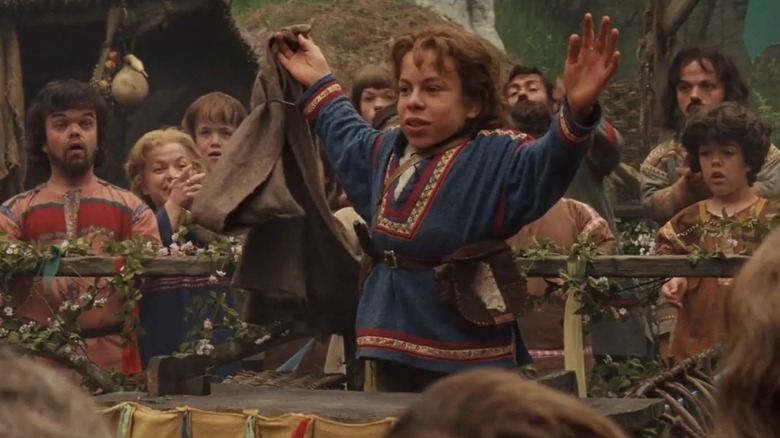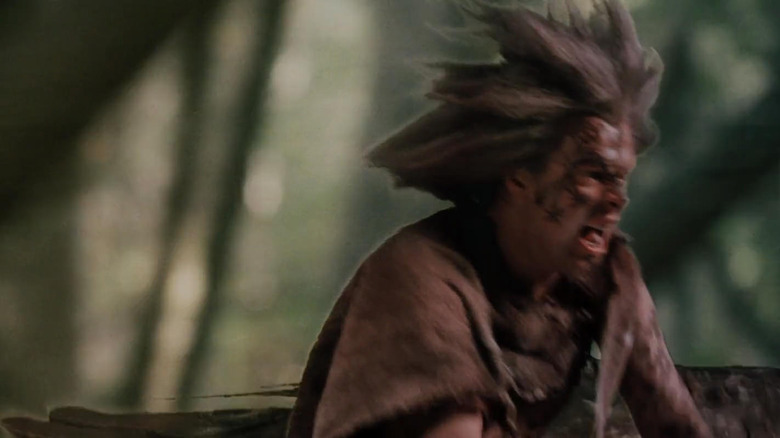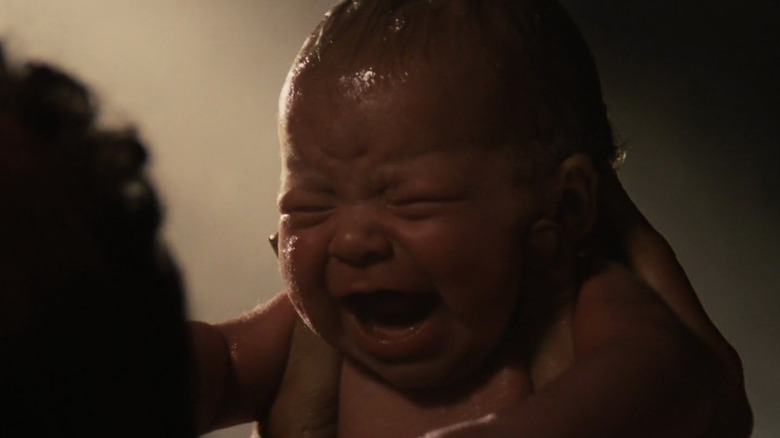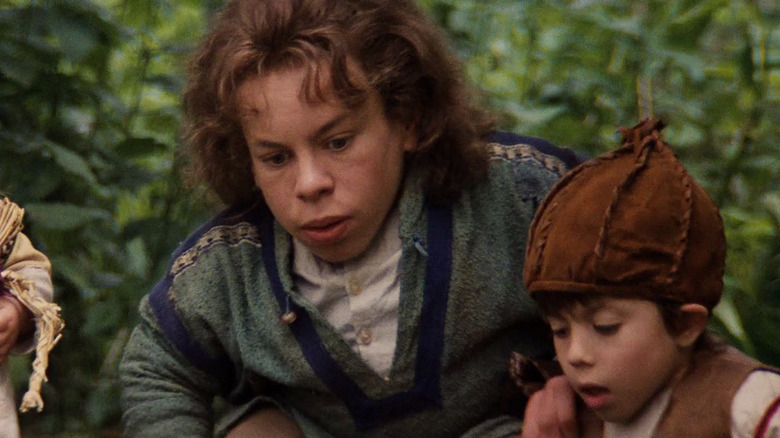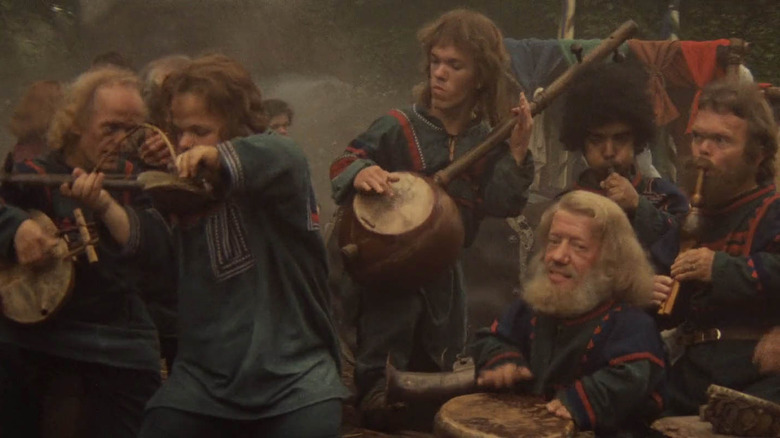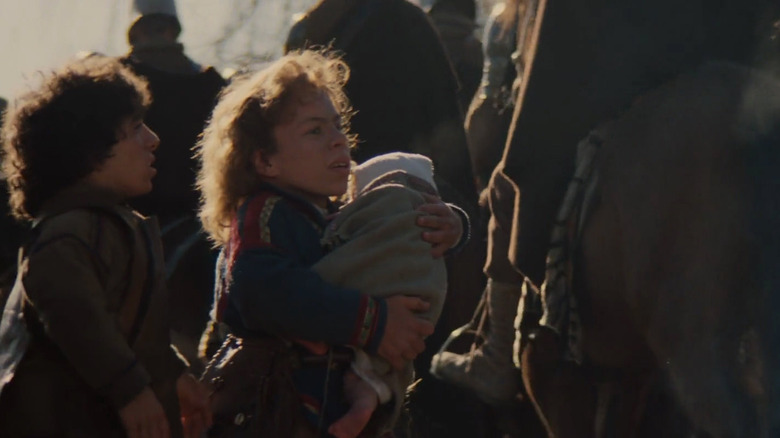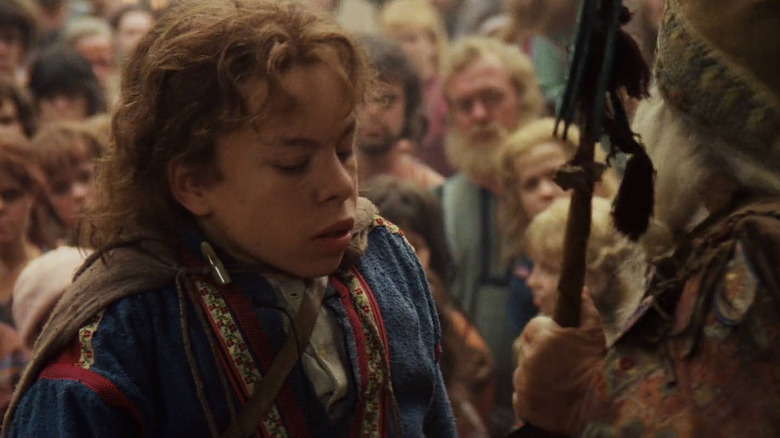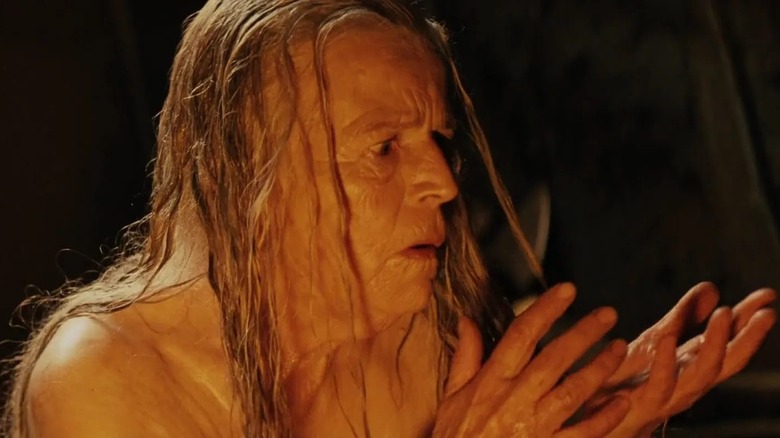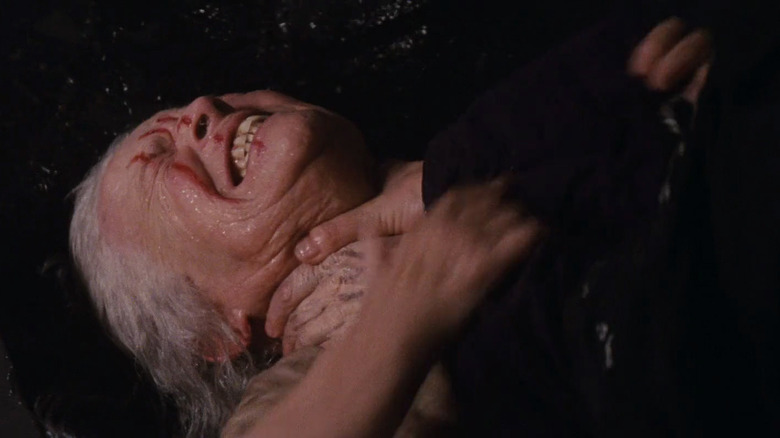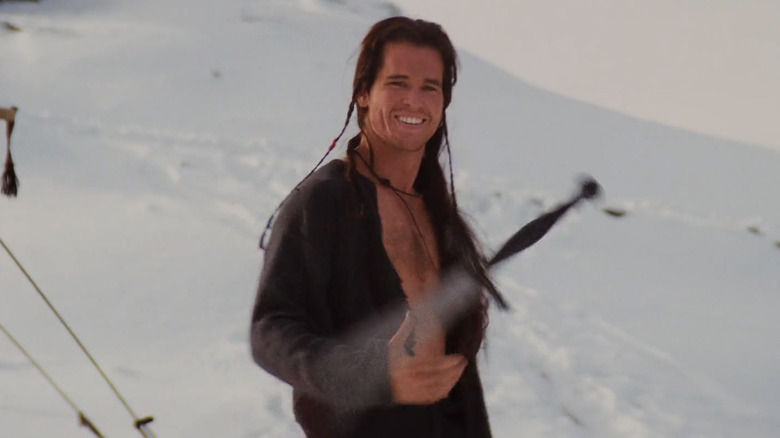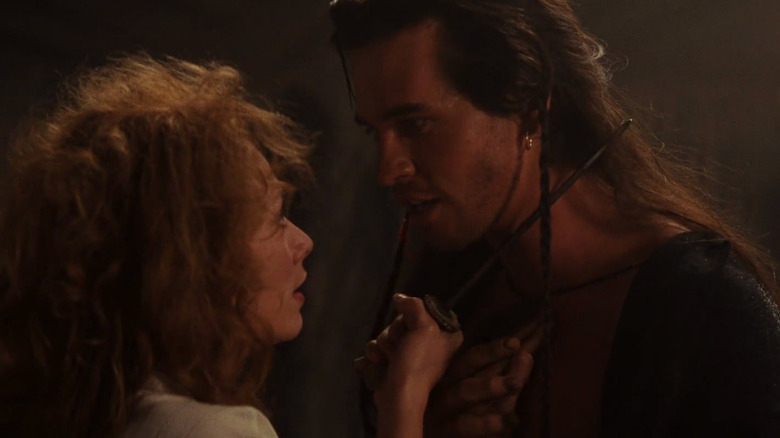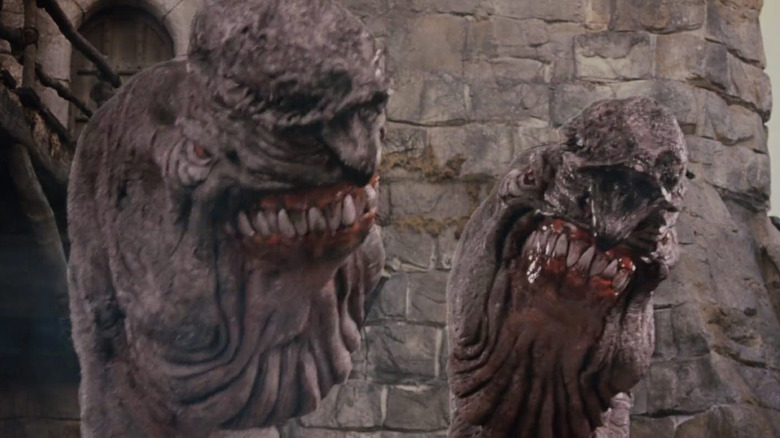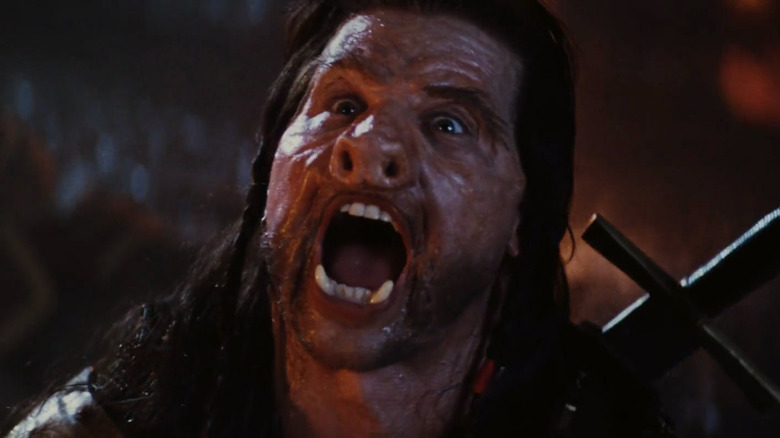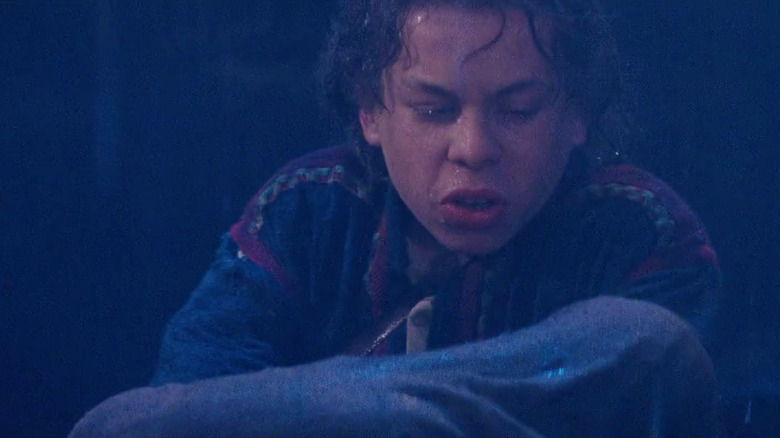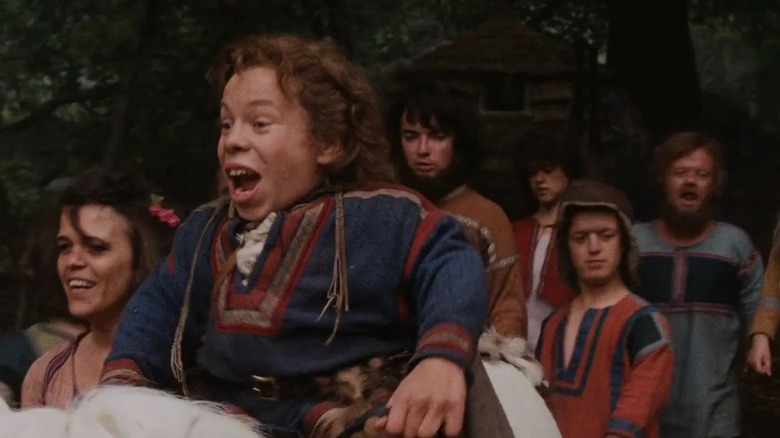The 14 Best Moments In Willow, Ranked
Despite Ron Howard directing a story by producer George Lucas, "Willow" was met with unexpectedly low box office returns and mixed reviews from critics upon its debut in 1988. But home media viewership has generated a cult following for the film, and neither Lucas, Howard nor Lucasfilm's new owners, Disney, have been able to let go of the idea of continuing "Willow."
Lucas teamed up with writer Chris Claremont to produce a trilogy of sequel novels to the film from 1995-2000, while Howard is executive producing a sequel streaming series (to be directed by Jonathan Entwistle) for Disney+, set to premiere in 2022.
Entire essays have been written about how the original "Willow" film subverted so many of the standard fantasy storytelling tropes, with a protagonist of short stature who paved the way for deft, respectful portrayals such as Peter Dinklage's Tyrion Lannister in HBO's "Game of Thrones."
As the playwright RVCBard observes, Warwick Davis' Willow Ufgood is not only a trickster hero, but a rare nurturing male figure, whose masculinity is measured by his insights, his empathy and his utter lack of any compulsion toward violence or domination over others.
What follows are some of the moments that help make "Willow" so special.
14. The Brownies Steal The Baby
The comic relief in many fantasy films tends to be tolerable at best, and by design, the audience initially shares Willow's frustration with the baby-snatching Brownies. But the benefit of casting veteran stand-up comedians and comic supporting actors like Kevin Pollak (of "The Usual Suspects") and Rick Overton (of "Beverly Hills Cop" and "Groundhog Day") as our tale's two lead Brownies, Rool and Franjean, is that they have experience in eliciting laughter without overshadowing their stories' leads.
More importantly, as servants of Cherlindrea, nicknamed "the lally Maiden of the Forest," the Brownies expand the mythos of Willow's world, making Nelwyns such as the diminutive Willow himself feel more like average folk, between the relatively towering human Daikinis and the tiny Lesser Faery, who underscore this scale of size by tying Willow up like the Lilliputians did Gulliver.
As much criticism as "Willow" has received for being so obviously inspired by the works of J.R.R. Tolkien, it's worth noting that, between the ethereal elegance of Tolkien's elves, the stout hardiness of his dwarves and the reclusive homeliness of his Hobbits, there was little room for fairies who embodied impish, silly mischief as well as Willow's Brownies.
13. Bavmorda Gets Biblical
What enables Jean Marsh to tear into her performance as Queen Bavmorda with such relish? She's not aiming for Alan Rickman as Severus Snape from the "Harry Potter" films; she's aiming for Rickman as Hans Gruber in "Die Hard."
As soon as it's prophesied that a child will be born who will ultimately dethrone her, Bavmorda wastes no time in pulling a PG-rated King Herod by rounding up all the pregnant women within her domain so they can give birth in her dungeons — allowing Bavmorda to more easily spot the prophesied child via her distinctive birthmark.
From there, Bavmorda has already prepared a ritual to banish the child's spirit into oblivion, having correctly recognized that brutality isn't effective unless it's efficient. Unfortunately for Bavmorda, one of her castle midwives responds with a John McClane move of her own by smuggling the infant, Elora Danan, out of the dungeons.
Bavmorda responds by sending her Death Dogs out to hunt down the midwife and Elora Danan. The dogs make short work of the midwife, but she maintains the Biblical theme by sending Elora down the river in a makeshift raft, to wash ashore on the banks of the Ufgood family farm.
12. Willow Is No Chosen One
When Elora first encounters the Ufgood family, we see that Willow Ufgood is no restless adolescent in the Luke Skywalker mold, but a doting father to two happily chattering children, a loving husband to a wife who reminds him to do what he knows is right, and a hard-working tenant farmer for a bullying blowhard of a landlord.
Both Bilbo and Frodo Baggins were called to their adventures as unmarried "gentlemen of leisure," but Willow is essentially Samwise Gamgee, years after marrying Rosie Cotton and starting his own family.
Warwick Davis was only 17 years old when "Willow" was filmed, and yet, he invests his performance as Willow Ufgood with the weight of a middle-aged, working-class family man.
Although the hero initially refuses the call to adventure in the "Hero's Journey" monomyth outlined by Joseph Campbell, most such heroes actually hate the prospect of embarking on an adventure about as much as Elizabeth Bennet actually hated Mr. Darcy.
Luke was the kid with big dreams who desperately needed to get out of his go-nowhere hometown, but Willow already has things he needs to do. What he doesn't need is any prophesied nonsense in his life.
11. The Nelwyn Village Fair
A casual viewer of "Willow" might be forgiven for reductively thinking of Nelwyns as trademark-dodging Hobbits, if not for the lively Nelwyn village fair, which makes clear their culture encompasses more than provincial agrarians.
Before CGI (and the clever in-camera forced-perspective shooting techniques of Peter Jackson) allowed actors of average height to play Hobbits, populating a live-action film with dwarves, Hobbits or characters of similar stature meant casting actors born with dwarfism, and "Willow" must have hired nearly every such actor available for its filming in 1987.
This makes for a remarkably diverse sea of faces, not just racially — yes, there are Black Nelwyns — but also performers who might not be considered conventionally attractive by Hollywood standards.
Billy Barty as the High Aldwin, auditioning prospective apprentices during the fair, shows that Nelwyns have cultivated their own traditions of sorcery, while the attack of Bavmorda's Devil Dogs on the village demonstrates that Nelwyns maintain a standing corps of spear-wielding warriors.
Aside from the High Aldwin auditioning apprentices, and Willow debuting his disappearing pig trick, this scene is arguably superfluous to the plot, but it makes the Nelwyn village feel like a real place, populated by real people.
10. "Outta the way, Peck!"
For as often as Tolkien-esque fantasy epics trade in stereotypes of fictional races, it's rare to see them wrestle with fictional racism.
Willow Ufgood's status as an audience-surrogate everyman is underscored by how almost every human (sorry, Daikini) he comes across is depicted as a gangly, clumsy, overgrown oaf by comparison, and is then hammered home by a surprisingly stinging fictional racial slur: "Peck."
When Willow and Madmartigan first face off at the crossroads, Madmartigan is relentless in repeatedly needling Willow with what might have sounded merely like a made-up, unwanted nickname, until legions of Daikini cavalry begin marching through, and one armored horseman responds to Willow's polite request for attention with a casually tossed-off "Outta the way, Peck!"
The thoughtlessness of the remark reveals that Madmartigan was basically blasting Willow with the Nelwyn equivalent of the N-word, and it feels all the more authentically insulting because there's no exposition or sermonizing devoted to it.
Not only is "peck" a perfect fictional slur — it's blunt, punchy and in no way feels cool — but Warwick Davis and Val Kilmer absolutely sell both Willow's offense and Madmartigan's mockery: "There's a peck here with an acorn pointed at me!"
9. "The power to control the world is in which finger?"
What makes the High Aldwin of the Nelwyns so wise is that he shares Terry Pratchett's understanding that "90 percent of most magic merely consists of knowing one extra fact."
When he conjures a bird to guide the Nelwyns in finding a Daikini guardian for Elora Danan, and the bird flies back to their village, he immediately barks, "Ignore the bird! Follow the river!"
Likewise, his ostensibly oracular bones tell the High Aldwin nothing, until he successfully cajoles Willow into admitting his love for the infant Elora, because the old sorcerer then knows for certain that Willow will care for the Daikini child like the good dad that he already is.
The High Aldwin's most powerful knowledge is what he requires of any would-be apprentice, and the question he poses is not a test of one's magical talents, but of their faith in themselves.
As Willow suspects, and the High Aldwin confirms, the finger with the power to control the world is one's own. It's a proactive affirmation of the ability each one of us has to make things better, without waiting on any higher powers to solve our problems.
8. The Transformations of Fin Raziel
Fin Raziel regaining her humanity the long way round manages to be both an in-story tragedy and a stealth running-gag that subverts our storytelling expectations.
Fin Raziel is continually built up as a sorceress powerful enough to tip the scales of battle against Bavmorda, whom even Madmartigan is anxious to see in human form when she describes herself as "a young, beautiful woman." It's something of a surprise, then, that by the time Willow manages to magic her back into her human body, nearly everyone else has been transformed into pigs (more on that below) and her youth has long since departed.
The story teases out the punchline of this already-extended gag by having Willow unintentionally transform Fin Raziel from a possum into a rook, then a goat, with Patricia Hayes attentively adjusting her voice-acting to sound distinctly like each animal when speaking.
Lucasfilm's Industrial Light & Magic pioneered advances in digital morphing technology that would be used by subsequent films such as 1991's "Terminator 2: Judgment Day."
Fin Raziel would transform into an ostrich, a peacock, a tortoise, and a tiger before she could gaze at her aged human body at last, and ask, "Has it been so long?"
7. Fin Raziel and Bavmorda Go Bare-Knuckles
When Fin Raziel and Bavmorda do come to blows, it's clear we're watching a gender-flipped version of master-wizards Gandalf versus Saruman from "The Lord of the Rings," except that Peter Jackson's portrayal of Gandalf and Saruman's bout in "The Fellowship of the Ring" seems strangely restrained in retrospect, particularly when compared to Fin Raziel and Bavmorda's brawl.
Both rounds of combat feature sorcerers vying for powerful spell-casting staffs and flinging each other across the spacious interiors of castle towers, but while Saruman's got the jump on Gandalf from the moment he arrives at Isengard, Fin Raziel rolls into the room well-prepared to throw down with Bavmorda.
Unlike Tolkien's wizards, the rain-drenched sorceresses not only envelop each other in fireballs and ice blasts, but their collateral damage scatters lightning bolts aimlessly and animates random items of furniture into ravenous creatures.
The tussle descends to Fin Raziel, her face bloody from Bavmorda's claw-marks, delivering a quick succession of punches to the bridge of Bavmorda's nose, which Bavmorda counters by wringing Fin Raziel's neck with her bare hands until she stops struggling.
Neither woman willingly taps out, and they make their male counterparts seem like quitters by comparison.
6. The Greatest Swordsman That Ever Lived
Nearly any scene with Val Kilmer as Madmartigan is bound to be gold, since he's so innately charming that he can almost redeem the transphobic trope of a macho man freaking out after finding out he's fallen for a dude dressed like a lady — "NOT A WOMAN!?" the Bunyanesque Llug bellows, after his wife's friend "Hilda" is unveiled as Madmartigan in the tavern. He can even seem cute while feeding an infant tobacco (sorry, "blackroot").
Kilmer is so convincingly buffoonish as Madmartigan that it's all the more satisfying when he lives up to his boasts of being "the greatest swordsman that ever lived," as he dazzles even the skeptical Willow by tossing his blade through the air with as much physics-defying panache as Kilmer's Doc Holliday would demonstrate when whipping out his pistols in 1993's "Tombstone."
Of course, Willow's awed praise of such skill is immediately undercut by Madmartigan slipping on a patch of ice and spilling onto his backside (although he still catches his sword), and when a subsequent tumble by Madmartigan sends him rolling downhill inside a giant cartoon-style snowball, it dips the punchline in bronze.
5. The Dust of Broken Heart
This was the love scene that sparked a real-life romance between costars Val Kilmer and Joanne Whalley, who got married the same year "Willow" was released in theaters.
A typical "love potion" plot tends to raise countless issues of consent, but instead of a man dosing a woman with a mind-altering drug to rob her of her free will, it's two fellas who accidentally get exposed to the Fairies' "Dust of Broken Heart," and wind up falling hard for wildly improbable targets, each of whom can easily fend off their amorous advances.
After the Brownie Rool becomes smitten with a housecat who's big enough to devour him like a mouse, Madmartigan loses his heart to Bavmorda's outwardly heartless daughter, the warrior Sorsha, and starts spouting earnestly yearning blank verse to a woman who's likely never heard the words "I love you" from anyone.
"Your touch is worth a hundred thousand deaths" is already a killer line to deliver to a gal who's literally willing to cut your throat, but Kilmer sells it so well, I suspect even some of the supposedly straight guys in the audience felt as wooed as Whalley did.
4. The Troll Transforms
When Willow and Madmartigan arrive at Tir Asleen, they find the castle's former inhabitants frozen in monolithic blocks before discovering its ruins are now swarming with apelike trolls. Shortly thereafter, Bavmorda's army shows up to storm its gates, but that's not the worst our heroes will have to deal with here.
When Willow zaps one troll with the magic wand given to him by Cherlindrea, he unintentionally transforms the previously diminutive creature (not much bigger than a Nelwyn, albeit with longer limbs) into a gigantic, two-headed, flame-breathing Eborsisk.
Ironically, this initially intimidates Bavmorda's invaders into retreating, and Madmartigan mistakenly believes he's managed to repel them through a show of his formidability as a warrior — until he turns around to spot the gargantuan grotesquerie looming behind him, ready to roast his shiny new armor to a crisp.
Putting a player that powerful on the field complicates an already fraught battle in multiple hilarious trajectories, as Madmartigan instinctively flees in the same direction as Bavmorda's soldiers, who take a minute to realize the enemy they came for is standing alongside them.
As derivative as the swords-and-sorcery subgenre can be, the Eborsisk is imaginatively conceived, richly rendered, and genuinely unexpected.
3. "You're all pigs!"
Like James Hong's David Lo Pan in "Big Trouble in Little China," Jean Marsh's Queen Bavmorda is refreshingly unrepentant about her evil scheme. Even when all the people of her realm set aside their petty differences to mass together on her doorstep, driven by the principle that murdering a baby and destroying her soul is wrong, Bavmorda doesn't even blink.
The sorceress continues to steal moves from the best, this time swiping Circe's signature move from "The Odyssey," as she surveys the armies assembled against her and cackles confidently.
"You're not warriors," Bavmorda declares. "You're pigs!"
Rather than suddenly appearing as pigs in a flash of light, Madmartigan and his fellow soldiers double over and grunt in physical pain, gradually sprouting tusks, trotters and snouts in Uncanny Valley-evoking progressive transitional stages between man and animal, much like Val Kilmer would revisit in 1996's "The Island of Dr. Moreau."
If you're holding out hope Bavmorda might harbor some hidden tenderness for the daughter who's betrayed her, you haven't been paying attention: When Sorsha calls for her mother to stop, Bavmorda casts a dose of the spell directly at her, as pointed as an upthrust middle finger.
2. Willow's Disappearing Pig Trick
For a child who's prophesied to bring down the misrule of the evil Queen Bavmorda, Elora Danan doesn't really do anything. Neither she nor her guardian, aspiring sorcerer Willow Ufgood, score any victories through innate magical gifts. In spite of being a prophesied child, Elora is arguably no more a chosen one than Willow.
But what Willow figures out along the way is how to use the skills he's got to flummox the overconfident big people who so blithely dismiss him.
Neither Cherlindrea's wand nor the High Aldwin's acorns (which can turn to stone whatever they're thrown at) are sufficient to vanquish Bavmorda, but then, she's never seen Willow perform his disappearing pig trick at the Nelwyn village fair. So when Willow claims he can send Elora into a realm where evil cannot touch her, Bavmorda scoffs at first — "Impossible! There's no such place!" — but is utterly undone when the infant actually disappears, even though it was merely a simple stage illusionist's misdirection.
For all her well-laid plans, dark powers, and fighting forces, Queen Bavmorda is defeated neither by the swordsman Madmartigan nor by her daughter Sorsha, but by a Nelwyn peasant farmer.
1. Willow's Homecoming
The conclusion of J.R.R. Tolkien's "The Return of the King" literally scours the Shire to underscore the message that you can't go home again. The conclusion of George Lucas and Ron Howard's "Willow" says, "Nah, forget that downer noise," and gives our hero the happy ending he's earned.
Virtually everyone in the Nelwyn village greets Willow's return by cheering and congratulating him, the High Aldwin clasps his hand in silent recognition of the personal growth he's attained through his adventures, and he even gets in a bit of petty revenge by conjuring a bird that poops on the face of his jerk landlord Burglekutt, to the laughter of his fellow villagers.
But it's Warwick Davis and Julie Peters' performances, as Willow and his wife Kaiya, that are sure to choke up all but the most hard-hearted of viewers, as they rush to reunite after Kaiya whispers Willow's name upon first sighting him, as though she can barely believe he made it back.
Even though this ending mimics a number of the basic beats of the Ewok village celebration at the close of the original edition of "Return of the Jedi," it simply sings so much better in "Willow."
